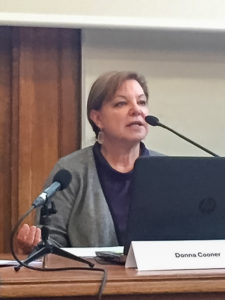
Teens’ use of social media and its impact on their mental health has attracted lots of media attention recently. School of Education professor and young adult novelist Donna Cooner tackled this topic in her presentation at the Groupement d’Intérêt Scientifique conference held at the Sorbonne in Paris, France, in Oct. 2019. Cooner’s session, “A Game of Social Thrones: The Influence of Social Media on Young Adults’ Self Esteem,” addressed social media and the growing social media addiction with teenagers.
Cooner is a faculty member in the School’s Center for Educator Preparation, particularly the principal licensure Master of Education program. Her research focuses on professional development in schools, the principalship, teacher education, and literacy. In addition to her research, Cooner is also an author of over twenty picture books, several young adult novels, and has written for children’s Public Broadcasting Service television shows.
‘A Game of Social Thrones’

The Groupement d’Intérêt Scientifique is the first interdisciplinary and international conference dedicated to gaming and the scientific achievements of gaming in the fields of medicine, literature, social sciences, and humanities in order to make it possible to better consider current and future consequences of game play and technology-based addiction. The conference looked at scientific lenses, environmental lenses, societal lenses, and more to present an all-encompassing discussion of gaming.
Invited by the comparative literature department at the Sorbonne, Cooner drew on a combination of her educational research and teaching background to explain social media addiction in the real and fictional world.
“I summarized my educational research around social media and social media addiction with teenagers, and tied it into the fictional world I create in my novels,” said Cooner. “My presentation touched on the trends we’re seeing in our schools and the issue of ‘highlight reels’. Teens are addicted to social media because they think the highlight reel is real life, when in fact it’s very curated and selected to show the perfect life. And we know these interactions with social media can cause depression and anxiety in teens, so I talked about how to represent that in a fictional world to allow teens to talk about it and view the consequences through story.”
Discovering international similarities
As the only novelist and educator to present, Cooner crossed boundaries of languages and disciplines to approach her presentation in a different way compared to other presentations at the conference.
“Most of the people at this particular conference were bringing a very scientific point of view,” she said. “So I think bringing an educators lens to the international discussion introduced a different outlook on what we know is happening with teenagers and social media. I was able to do more teaching in that aspect, instead of presenting a research paper or project.”
Along with teaching, Cooner was able to engage in educational opportunities herself, approaching the conference as a learning opportunity to interact with and understand situations in different cultures and different languages.
“It was really challenging to go through a whole conference and try to get as much as I could from the PowerPoints and the presentations in a language I did not understand,” said Cooner. “I think it was also a learning experience to be in that kind of a setting and navigate a world where I was trying to understand the language at the same time I was trying to understand very complex projects and presentations.”
With attendees from all over the world, Cooner was introduced to new connections and conversations that opened her eyes to the similarities of people across the globe, rather than their differences, even despite language barriers.
“I had a very interesting conversation with a gentleman from Iran about how he felt my books were very applicable to teenagers in Iran, and I never thought about that,” said Cooner. “I didn’t realize how many different countries were dealing with similar issues regarding social media. Just being there, and being a part of the community, made me realize a lot of the issues countries are facing share similarities rather than differences, even if the languages are very different. It was interesting to see we aren’t alone even though we may feel that way.”
The Center for Educator Preparation is housed in the School of Education, part of CSU’s College of Health and Human Sciences.